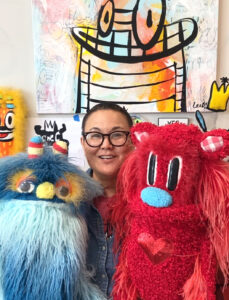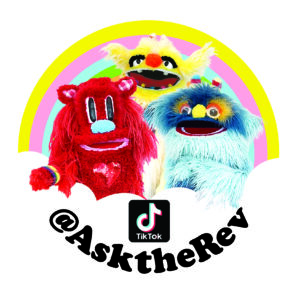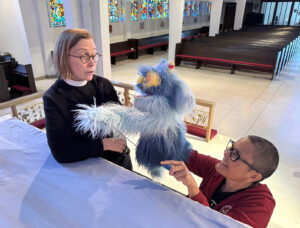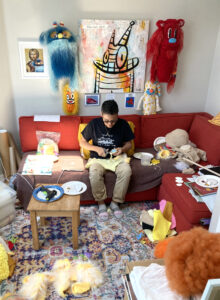It’s a serious thing to say “I don’t think God loves me” to a pastor face to face, and a seriously personal interaction to video and post on TikTok. Unless one of those faces is bright red with a round blue nose and shaggy fur, in which case the whole thing becomes a little less serious, a lot more playful.
The artist behind AsktheRev, a puppet ministry project out of St. Augustine by-the-Sea, who asked to be referred to by her artist name Leebs, said that the puppets allow her to ask real questions and access different parts of herself more easily. The fact that puppets pose the questions to clergy tempers the seriousness with playfulness.
“It’s accessing another part of myself, or I’m forgetting about myself because I have this thing on, and this becomes my voice, in a way,” Leebs said. “Whereas if I’m sitting here and I’m talking to you, it’s almost too serious” when asking hard questions.
Each video features, in addition to a clergy member of the Episcopal Church, Curio, a blue creature with horns and curiosity that can verge on antagonism, Chalice, a bright yellow creature excited about liturgy, spelling, and everything else, or TeAmo, a more thoughtful creature, red with long eyes and a bright sequin heart on its chest. “I think they all are me,” Leebs said. “The one that I am probably most resonating with these days is Chalice, because of that energy of excitement. ‘Yeah, this is the world!’ And when I’m thinking about things in a more community way it’s gonna be TeAmo. And then Curio is just like, ‘Well, if God is real. Then why do we have suffering?’ So it’s all it’s all different parts of me.”
The videos are posted on TikTok, where @AsktheRev has a following of more than 1900 and Instagram, as ask_the_rev.
Leebs said she grew up in a very judgmental church, and was looking for a new church community for six years before finding St. Augustine by-the-sea. She joined in 2018, was baptized in 2019, and the first video, featuring the Rev. Katie Cadigan, associate rector at the church, and TeAmo, was released in 2022. Leebs had the initial idea for the puppet ministry project in 2019.
“I had my own curiosities and my own questions about God, and being in a church that was inviting and just almost encouraged us to have questions and to, to challenge God, I think, fostered this whole project,” Leebs said. “I felt safe.”
The project fit with her personality, Leebs said, combining her curiosity with her love of play and her theological questions with her sense that God’s presence is found in moments of joy, laughter, and uniqueness. It also fit with the church, where she could ask direct questions about religion and her past religious experiences.
“So the first question that I always had a problem with was, hell,” Leebs said. “Am I gonna go to hell? I’m a lesbian, right? And using the puppets as a way to ask that, with the puppets it’s serious and it’s not, because I’m playing.”
Leebs first suggested the idea to Cadigan, who is now a main collaborator on the project and often does the camerawork when she’s not appearing in the video, and Cadigan said she loved the idea right away. She said that the project seemed like a perfect and unconventional way to reach out to the church-phobic and those had been in and left negative church situations.
Cadigan said she ran to tell the Rev. Nate Rugh, rector of St. Augustine by-the-Sea. She told him about the idea, and said the puppets would ask them simple theological questions like ‘what is God?’ “I’m thinking ‘well, the way I’d answer is, God is love,’” Cadigan said. “And he goes, ‘Oh, Katie, that is not a simple question.’ And right in that you could see the seeds of the diversity of what could be expressed about the spirit. Because God is ineffable, and God is beyond words. And so here’s a way to get at a dimension of expressing God that can come through the different clergy people.”
The project began with the puppets asking questions alternately to Rugh and Cadigan, but they soon began incorporating more clergy voices, mostly guest-preachers at the parish. Leebs and Cadigan said that as the projects continues, they hope to do videos featuring leaders in other denominations and faith traditions.
Cadigan said that the demographics information available from their TikTok and Instagram pages indicate that the majority of their viewers are under 34. “So it’s a demographic the Episcopal Church, let us say, does not excel with,” Cadigan said. In October 2024, Leebs and Cadigan applied for an Episcopal Evangelism grant for the project, and received $1000. With the funding, they’ve bought some equipment and reimbursed Leebs for some of her some of her expenses for Ask the Rev. They currently aim to produce about two videos per week.
Leebs said the videos were always meant for adults, specifically those who have experienced judgmental religious settings, as she had in the past. She said a lot of people assume the videos are made for children, but really she wants to bring childlike curiosity and wonder to adults. “I mean, we’re all children, in a way, and I’m like a child,” Leebs said. “I’m growing up in God with the use of the puppets. I guess I never grew up, so it’s my way of playing. It’s just my nature.”
While Cadigan and Leebs are hoping to continue growing the project, it has never been very goal-oriented. “The puppets became the vehicle to grow deeper in my own learning and curiosity about God,” Leebs said. “I could ask anything, so let’s go with it. It’s just going with the flow and the play. Let’s just have fun. We’re trusting God in this whole process.”
Cadigan said that nature of the project is to be authentic and unplanned. None of the videos are scripted, and they rarely do more than one take, she said.
“I think of them as kind of like patio questions or coffee hour questions. And when we’re one on one with people, you can’t go ‘could we stop and retake?’” Cadigan said. “I find it’s freeing, in a sense, like it is what it is, the Holy Spirit will speak.
“It’s a fun experience, so it helps me reconnect, or connect, or live into the delight and the joy and the love of who God is. And in the everyday clergy life, we’re not always getting to experience that in such a focused way.”




